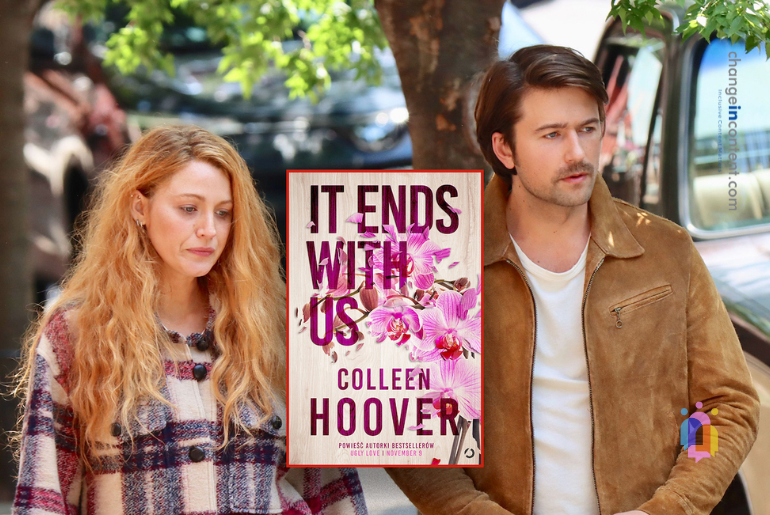Colleen Hoover’s hit novel ‘It Ends With Us’ gained massive popularity across BookTok, Bookstagram, and Booktube, especially among young women readers. First published in 2016, the novel’s social media buzz skyrocketed its fame. That also led to a sequel in 2022. The excitement reached new heights when news broke that Blake Lively and Justin Baldoni were cast in the film adaptation.
But as anticipation for the film grew, so did controversy. Social media users were quick to express their dissatisfaction, not just with the casting but with the film’s tone-deaf marketing campaign. What could have been a powerful conversation about domestic abuse turned into one of Hollywood’s messiest marketing failures.
Understanding “It Ends With Us”
Before we discuss the marketing missteps, let’s examine the story and its significance.
The storyline and themes
It Ends With Us follows the life of Lily Blossom Bloom, who grew up with an abusive father. After his death, she meets Ryle Kincaid, a wealthy neurosurgeon, and their relationship quickly becomes abusive. It echoes the trauma Lily witnessed in her parents’ marriage. The story’s core message revolves around breaking the cycle of abuse. Lily leaves Ryle for the sake of her daughter and opens the door to a potential new relationship with her first love, Atlas Corrigan.
The true message behind the title
The novel’s title, It Ends With Us, holds deep significance. It refers to Lily’s decision to break the generational cycle of abuse. However, while the book touches on love and relationships, it is far from a traditional romance. It is about survival, resilience, and addressing domestic violence. Marketing it as a romance misses the mark entirely.
It Ends With Us: A tone-deaf marketing campaign
The disconnect between the novel’s message and the marketing strategy of the film adaptation is striking. Instead of addressing the serious issue of domestic abuse, the promotional material presented the film as light-hearted entertainment, a glaring misstep given the subject matter.
The romanticised promotion
In one particularly shocking TikTok video, Blake Lively invites viewers to “grab your friends, wear your florals, and head out to see it!” This flippant tone suggests the movie is suitable for a casual girls’ night out. It downplays the severity of the story’s themes. It is not a film about love triangles and fun dates—it is about domestic abuse. Hence, it deserves a more respectful and thoughtful approach.
Misaligned product promotions
Another major faux pas in the marketing of ‘It Ends With Us’ was Lively’s decision to promote her alcoholic drinks alongside the movie. Given the connection between alcohol and domestic violence—55% of perpetrators were found to be drinking prior to committing abuse—this was a deeply insensitive move. Moreover, the name of one of the drinks, “Ryle You Wait,” trivialises the character’s abusive behaviour.
Merchandise that misses the point
The tone-deafness continued with the merchandise. A ‘It Ends With Us’ colouring book was released, only to be pulled within 24 hours after backlash. The idea of turning a story about domestic abuse into a playful, juvenile activity was nothing short of inappropriate. Adding to this was a nail polish collection themed around both ‘It Ends With Us’ and November 9, another of Hoover’s books dealing with disturbing themes.
The stark contrast in promotion tactics
Blake Lively’s approach starkly contrasts with Justin Baldoni’s, who took a more sensitive stance. His Instagram bio linked directly to No More, an anti-domestic abuse nonprofit that partnered with the film. His posts promoted awareness of domestic violence. He even collaborated with the organisation to depict the violence shown in the movie accurately. While Lively focused on product launches, Baldoni remained true to the heart of the story.
Media interviews: Missing the mark again
During the film’s press tour, Lively’s interactions with journalists further exacerbated the problem. When journalist Jake Hamilton asked her how fans should approach her to discuss the film’s themes, she responded with an ill-timed joke, suggesting, “Like asking for my address, or my phone number, or, like, location share?” Given the subject matter, the attempt at humour fell flat and once again diminished the seriousness of the film’s focus on domestic abuse.
The final thoughts on It Ends With Us
Headlines may call It Ends With Us the biggest “romantic drama” in years, but this description is misleading. The marketing campaign’s romanticisation of domestic violence has caused outrage, and rightly so. Presenting this narrative as a romantic love story undermines the serious themes at its core. By focusing on product promotions and tone-deaf social media posts, the film’s campaign has turned what could have been an important conversation about domestic violence into a marketing disaster.
It is time Hollywood—and brands associated with serious topics—takes responsibility for how they portray these issues. More importantly, they need to be mindful of the impact their campaigns can have on survivors and the public.
Disclaimer: The views expressed in this article are based on the writer’s insights, supported by data and resources available both online and offline, as applicable. Changeincontent.com is committed to promoting inclusivity across all forms of content, which we broadly define as media, policies, law, and history—encompassing all elements that influence the lives of women and gender-queer individuals. Our goal is to promote understanding and advocate for comprehensive inclusivity.


